八年级英语下册《8B Unit 1 Past and present》Period 7 Main Task教案 牛津版
八年级英语8B Unit 1 Past and present译林版知识精讲

八年级英语8B Unit1Past and present译林版【本讲教育信息】一. 教学内容:8B Unit1Past and presentGrammar 现在完成时现在完成时用来表示之前已发生或完成的动作或状态,但它的影响现在还存在;也可表示持续到现在的动作或状态。
其构成:have (has) +过去分词。
规则变化的过去分词与过去式的变化一样,在动词词尾加ed; 不规则变化的过去分词见不规则动词表,需要同学记忆。
现以see the film为例将现在完成时的肯定句,否定句和疑问句列表如下:肯定句:I/You/We/They have seen the film.He/She /It has seen the film.否定句:I/You/We/They have not/ haven’t seen the film.He/ She/It has not/hasn’t seen the film.疑问句:Have I/you/they seen the film? Yes, you/ we/I/they have. No, you/ we/I/they ha ven’t.Has he/she/it seen the film? Yes, he/ she/ it has. No, he/ she/ it hasn’t.现在完成时中常用的一些表达:already: 已经,常用于肯定句中,放在句中或句末。
用于疑问句常表示惊讶疑惑。
yet 已经,还,常用于疑问句和否定句中,放在句末。
ever 曾经,常用于疑问句中,放在句中。
never 从不,表示否定,放在句中。
just刚刚,常用于肯定句中,放在句中。
since 自从…以来,后面接时间点或从句。
for 后面接一段时间。
例:I have finished my homework already.My cousin hasn’t returned the library book yet.They have just given the food to the poor boy.Have you ever spoken to a foreigner? No, never.I have known him since ten years ago/ for ten years.My sister has lived in Canada since she was born.现在完成时中应注意的几个问题1. have been to 和have gone to的区别have been to 强调“去过”,现已不在那里,如:He has been to the USA three times.他到美国去过三次。
8B Unit 1 Past and present知识清单
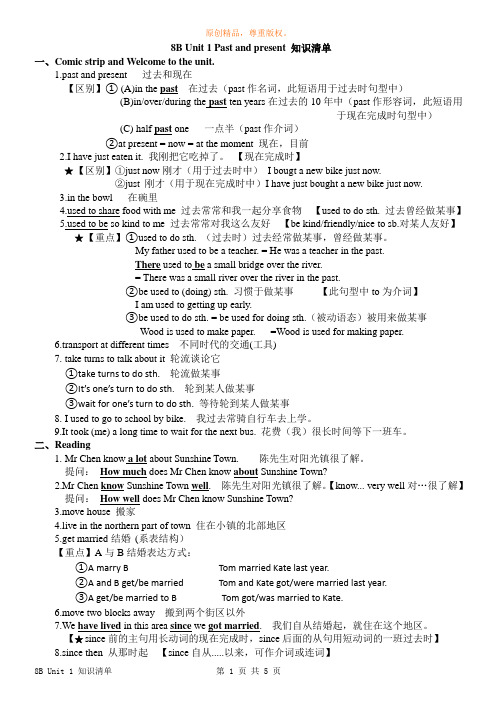
8B Unit 1 Past and present 知识清单一、Comic strip and Welcome to the unit.1.past and present 过去和现在【区别】① (A)in the past在过去(past作名词,此短语用于过去时句型中)(B)in/over/during the past ten years在过去的10年中(past作形容词,此短语用于现在完成时句型中)(C) half past one 一点半(past作介词)②at present = now = at the moment 现在,目前2.I have just eaten it. 我刚把它吃掉了。
【现在完成时】★【区别】①just now刚才(用于过去时中)I bougt a new bike just now.②just 刚才(用于现在完成时中)I have just bought a new bike just now.3.in the bowl 在碗里ed to share food with me 过去常常和我一起分享食物【used to do sth. 过去曾经做某事】ed to be so kind to me 过去常常对我这么友好【be kind/friendly/nice to sb.对某人友好】★【重点】①used to do sth. (过去时)过去经常做某事,曾经做某事。
My father used to be a teacher. = He was a teacher in the past.There used to be a small bridge over the river.= There was a small river over the river in the past.②be used to (doing) sth. 习惯于做某事【此句型中to为介词】I am used to getting up early.③be used to do sth. = be used for doing sth.(被动语态)被用来做某事Wood is used to make paper. =Wood is used for making paper.6.transport at different times 不同时代的交通(工具)7. take turns to talk about it 轮流谈论它①take turns to do sth. 轮流做某事②It’s one’s turn to do sth. 轮到某人做某事③wait for one’s turn to do sth. 等待轮到某人做某事8. I used to go to school by bike. 我过去常骑自行车去上学。
八年级英语下册《8B Unit 1 Past and present》Period 1 Comic strip
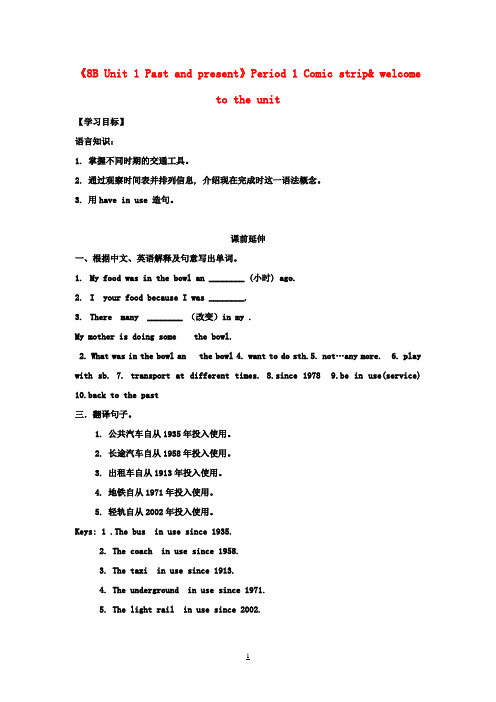
《8B Unit 1 Past and present》Period 1 Comic strip& welcometo the unit【学习目标】语言知识:1. 掌握不同时期的交通工具。
2. 通过观察时间表并排列信息, 介绍现在完成时这一语法概念。
3. 用have in use 造句。
课前延伸一、根据中文、英语解释及句意写出单词。
1.My food was in the bowl an ________ (小时) ago.2.I your food because I was ________.3.There many ________ (改变)in my .My mother is doing some the bowl.2. What was in the bowl an the bowl 4. want to do sth.5. not…any more. 6. play with sb. 7. transport at different times. 8.since 1978 9.be in use(service) 10.back to the past三.翻译句子。
1. 公共汽车自从1935年投入使用。
2. 长途汽车自从1958年投入使用。
3. 出租车自从1913年投入使用。
4. 地铁自从1971年投入使用。
5. 轻轨自从2002年投入使用。
Keys: 1 .The bus in use since 1935.2. The coach in use since 1958.3. The taxi in use since 1913.4. The underground in use since 1971.5. The light rail in use since 2002.课后提升1. Recite all the new words we’ve learnt today.2. Find more information about transport at different times on the Internet.3.用所给词的正确形式填空。
苏教版译林牛津英语8B单词表(含音标精编版)
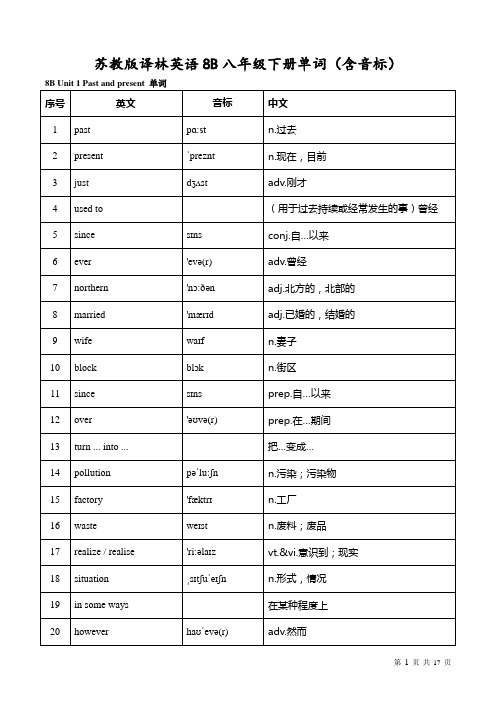
tiny
'taɪnɪ
adj.极小的
18
fall over
摔倒
19
continue
kən'tɪnju:
vi.&vt.继续
20
either
ˈaɪðə(r)
adv.也
21
manage
'mænɪdʒ
vi.&vt.设法完成;管理
22
lift
lɪft
vt.举起,抬高;提高
23
army
'ɑ:mɪ
n.大批,大群
ˈgæðə(r)
*vi.&vt.聚集,集合
54
darkness
'dɑ:knəs
*n.黑暗
55
lawn
lɔ:n
*n.草坪
56
musical
ˈmju:zikəl
*n.音乐剧
57
sail
seɪl
*n.帆
8B Unit4A good read单词
序号
英文
音标
中文
1
read
ri:d
n.读物
2
cooking
ˈkʊkɪŋ
rɪ'məʊt kən'trəʊl
*n.遥控器
48
ah
ɑ:
*excl.(表示惊奇,高兴等)啊
49
channel
'tʃænl
*n.频道
50
word processing
wə:d prəʊˈsesɪŋ
*n.文字处理
51
icon
'aɪkɒn
*n.图标
52
click
八年级英语下册Unit 1 Past and present (8)
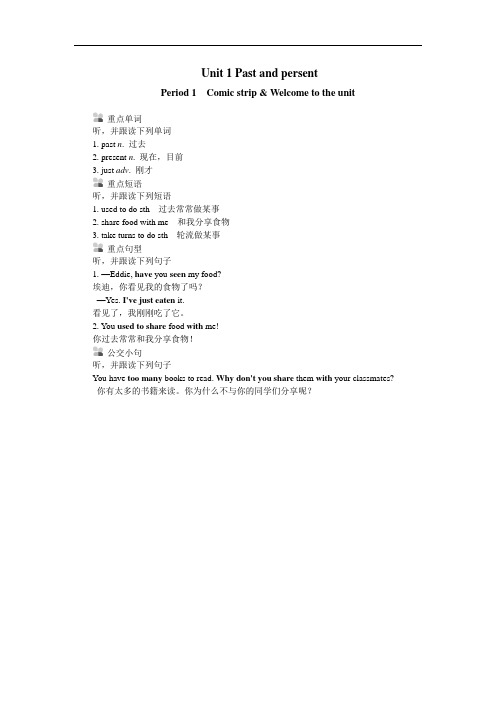
Unit 1 Past and persent
Period 1Comic strip & Welcome to the unit
重点单词
听,并跟读下列单词
1. past n. 过去
2. present n. 现在,目前
3. just adv. 刚才
重点短语
听,并跟读下列短语
1. used to do sth过去常常做某事
2. share food with me和我分享食物
3. take turns to do sth轮流做某事
重点句型
听,并跟读下列句子
1. —Eddie, have you seen my food?
埃迪,你看见我的食物了吗?
—Yes. I've just eaten it.
看见了,我刚刚吃了它。
2. You used to share food with me!
你过去常常和我分享食物!
公交小句
听,并跟读下列句子
You have too many books to read. Why don't you share them with your classmates? 你有太多的书籍来读。
你为什么不与你的同学们分享呢?。
牛津英语8BUnit1Pastandpresent单元分析及课时教案
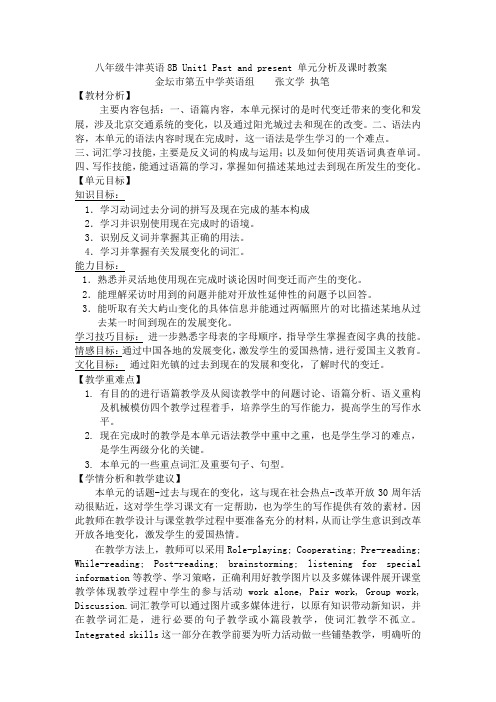
八年级牛津英语8B Unit1 Past and present 单元分析及课时教案金坛市第五中学英语组张文学执笔【教材分析】主要内容包括:一、语篇内容,本单元探讨的是时代变迁带来的变化和发展,涉及北京交通系统的变化,以及通过阳光城过去和现在的改变。
二、语法内容,本单元的语法内容时现在完成时,这一语法是学生学习的一个难点。
三、词汇学习技能,主要是反义词的构成与运用;以及如何使用英语词典查单词。
四、写作技能,能通过语篇的学习,掌握如何描述某地过去到现在所发生的变化。
【单元目标】知识目标:1.学习动词过去分词的拼写及现在完成的基本构成2.学习并识别使用现在完成时的语境。
3.识别反义词并掌握其正确的用法。
4.学习并掌握有关发展变化的词汇。
能力目标:1.熟悉并灵活地使用现在完成时谈论因时间变迁而产生的变化。
2.能理解采访时用到的问题并能对开放性延伸性的问题予以回答。
3.能听取有关大屿山变化的具体信息并能通过两幅照片的对比描述某地从过去某一时间到现在的发展变化。
学习技巧目标:进一步熟悉字母表的字母顺序,指导学生掌握查阅字典的技能。
情感目标:通过中国各地的发展变化,激发学生的爱国热情,进行爱国主义教育。
文化目标:通过阳光镇的过去到现在的发展和变化,了解时代的变迁。
【教学重难点】1.有目的的进行语篇教学及从阅读教学中的问题讨论、语篇分析、语义重构及机械模仿四个教学过程着手,培养学生的写作能力,提高学生的写作水平。
2. 现在完成时的教学是本单元语法教学中重中之重,也是学生学习的难点,是学生两级分化的关键。
3. 本单元的一些重点词汇及重要句子、句型。
【学情分析和教学建议】本单元的话题-过去与现在的变化,这与现在社会热点-改革开放30周年活动很贴近,这对学生学习课文有一定帮助,也为学生的写作提供有效的素材。
因此教师在教学设计与课堂教学过程中要准备充分的材料,从而让学生意识到改革开放各地变化,激发学生的爱国热情。
在教学方法上,教师可以采用Role-playing; Cooperating; Pre-reading; While-reading; Post-reading; brainstorming; listening for special information等教学、学习策略,正确利用好教学图片以及多媒体课件展开课堂教学体现教学过程中学生的参与活动work alone, Pair work, Group work, Discussion.词汇教学可以通过图片或多媒体进行,以原有知识带动新知识,并在教学词汇是,进行必要的句子教学或小篇段教学,使词汇教学不孤立。
牛津译林版 8B八年级下册 Unit1 Past and present 知识点梳理
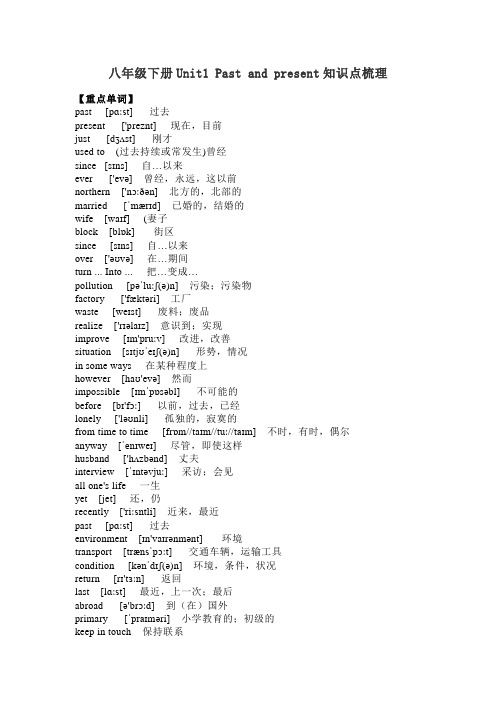
八年级下册Unit1 Past and present知识点梳理【重点单词】past [pɑːst]过去present ['preznt] 现在,目前just [dʒʌst] 刚才used to (过去持续或常发生)曾经since [sɪns] 自…以来ever ['evə] 曾经,永远,这以前northern ['nɔːðən] 北方的,北部的married [ˈmærɪd] 已婚的,结婚的wife [waɪf] (妻子block [blɒk] 街区since [sɪns] 自…以来over ['əʊvə] 在…期间turn ... Into ... 把…变成…pollution [pəˈluːʃ(ə)n] 污染;污染物factory ['fæktəri] 工厂waste [weɪst] 废料;废品realize ['rɪəlaɪz] 意识到;实现improve [ɪm'pruːv]改进,改善situation [sɪtjʊˈeɪʃ(ə)n] 形势,情况in some ways 在某种程度上however [haʊ'evə] 然而impossible [ɪmˈpɒsəbl] 不可能的before [bɪ'fɔː]以前,过去,已经lonely ['ləʊnli] 孤独的,寂寞的from time to time [frɒm//taɪm//tuː//taɪm] 不时,有时,偶尔anyway [ˈenɪweɪ] 尽管,即使这样husband ['hʌzbənd] 丈夫interview [ˈɪntəvjuː]采访;会见all one's life 一生yet [jet] 还,仍recently ['riːsntli]近来,最近past [pɑːst]过去environment [ɪn'vaɪrənmənt] 环境transport [trænsˈpɔːt]交通车辆,运输工具condition [kənˈdɪʃ(ə)n] 环境,条件,状况return [rɪ'tɜːn]返回last [lɑːst]最近,上一次;最后abroad [ə'brɔːd]到(在)国外primary [ˈpraɪməri] 小学教育的;初级的keep in touch 保持联系communicate [kəˈmjuːnɪkeɪt] 交流,交际communication [kəmjuːnɪˈkeɪʃ(ə)n] 交流,交际exactly [ɪg'zæktli] (答语)正是,没错be/get used to 习惯于,适应于narrow [ˈnærəʊ] 狭窄的open space 开阔的空地【重点词组】1.in the bowl an hour ago一个小时之前在碗里的ed to do sth.过去常常做某事be used to doing sth. 习惯于做某事be used to do sth. 被用来做某事3.do a history project on the changes in Beijing over the years做个有关这些年北京的变化的历史调查4.write a report on the changes in your home town 写一个有关你家乡的变化的报道5.know about the different forms of transport 对不同形式的交通工具很了解6.talk about transport at different times 讨论不同时期的交通工具7.take turns to do sth.=do sth. by turns 轮流做某事8.go to school by bike = ride a bike to school 骑自行车去学校9.wait for the next one 等下一辆车10.go to school by bus= take a bus to school= go to school on the bus乘公交车去学校11.interview sb. to get some information 为了得到些信息采访某人12.know sunshine town very well 对阳光镇很了解13.be born 出生14.move house 搬家15.in the northern part of town 在这个镇的西部16.get married to sb.= marry sb.= be married to sb.和某人结婚17.marry sb. to sb. 把某人嫁给某人18.move two blocks away搬到两个街区以外19.live in this area 住在这个地区20.since then 自从那以后since I was born/ since last Saturday/since three days ago21.over the years 这些年over the past century 在过去的几个世纪22.in the town centre= in the centre of the town 在镇中心23.turn/change/put sth. into 把某物变成某物24.a steel factory 一个钢铁厂25.put the waste into the river 把垃圾倒入河里put down 记下put away 收好put on 穿上put off 推迟、延期26.take action to improve the situation采取行动改善这种情况27.in some ways 在某些方面on the way (to ) 在……的路上by the way 顺便说no way 没门in any way 无论如何28.most of my old friends大部分我的老朋友29.move away 搬走/move to(into) another town30.see each other as often as before像以前一样经常看到对方31.play cards and Chinese chess 打牌和下棋32.feel a bit lonely 感到有点孤单33.from time to time = at times = sometimes 有时34.because of being alone 因为独自一人35.a group of buildings with streets on all sides街道两边全是高楼on both sides/ on each side36.interview sb.= have an interview with sb. 采访某人37.all his life 整个他的一生38.in the past 在过去at present 现在39.make some notes 做些笔记40.waste sth. on sth./ sb.浪费某物在某物/某人上41.repair over ten bicycles= repair more than ten bicycles修理超过10辆自行车42.teach sb. a lot about the history of China教我很多有关中国的历史43.talk about a film about the history of Beijing讨论一个有关北京历史的影片44.learn more about Beijing’s past and present对北京的过去和现在了解更多45.hear about/of 听说hear from sb.= receive/ get one’s letter=receive/get a letter of sb.收到某人来信46.living conditions 居住条件47.return sth. to sb. 把某物归还给某人48.go abroad 去国外at home or abroad 在国内外49.at primary school 在小学50.keep in touch with each other 互相保持联系51.make communication much easier使得联系更容易Communicate with sb.和某人保持联系52.take place发生(有目的有计划的)、举行happen发生(偶然发生)53.green hills all around到处都是绿山54.a river runs through the centre of town一条小河穿过镇中心55.get used to the changes of life习惯了生活的变化56.on one’s own = by oneself = alone独自57.throw rubbish 扔垃圾58.in some large open spaces在一些大的开阔的地方59.move into new flats搬到新公寓去60.in their free time在他们业余时间61.travel around the town在镇里转转62.have their own cars= have cars of their own有他们自己的汽车e the new words to talk about my hometown用些新词来讨论我的家乡e facts to support my opinions用事实来支持我的观点【重点句型】1.There were always too many people on the bus, and it took a long time to wait for the next one.公共汽车上总是有太多的人,并且要花费很长时间等待下一趟。
牛津译林版八年级英语下册8Bunit1 past and present 单元语法全解

牛津英语8Bunit1 past and present课文要点全解Comic strip1.I've just eaten it我刚把它吃了。
(教材第6页)just此处用作副词,意为“刚刚,刚才”,通常与现在完成时连用。
Mr Wang has just left our classroom,王老师刚刚离开我们的教室。
I've just heard the news.我刚听到这个消息。
[拓展]①just副词,还可意为“正好,恰好;仅仅,只是”,起加强语气的作用。
This jacket is just my size.这件夹克衫正合我的尺码。
He is just a child他仅仅是一个孩子。
I just want to talk to you.我只是想和你谈谈。
②.just own意为“刚才”相当于a moment ago,.常用于句来,用于一般过去时态的句子中。
I met one of my friends in the street just now.我刚才在街上遇到了我的一个朋友。
③just then意为“就在那时”。
Just then, someone knocked at the door.就在那时,有人敲门。
中考●链接I'm not hungry because I have ______had lunch.A.everB. neverC. justD. still解析:我们可用“前后照应法”解答此题。
ever"曾经”;never“从不” ;just“刚才,刚刚”;sill还;仍”。
由主句句意“我不饿”可推知从句句意应为“因为我刚吃过午饭”。
故选C。
答案:C2.Why?为什么? (教材第6页)这是一个省略问句,其完整形式是"Why did you cat my food?。
why引导的特殊疑问句用来询问原因,通常用because (因为)引导的句子来回答。
- 1、下载文档前请自行甄别文档内容的完整性,平台不提供额外的编辑、内容补充、找答案等附加服务。
- 2、"仅部分预览"的文档,不可在线预览部分如存在完整性等问题,可反馈申请退款(可完整预览的文档不适用该条件!)。
- 3、如文档侵犯您的权益,请联系客服反馈,我们会尽快为您处理(人工客服工作时间:9:00-18:30)。
Title
(课题)
Main task
Type
(课型)
New
(新授课)
Period
(课时)
7
理论支撑
1.任务教学是在前苏联心理学家Vygotsky等人的语言与学习理论基础上,由Willis设计出的一种教学模式。该教学模式是以完成任务为主要教学形式。在“任务型”课堂上,学生始终处于一种积极的、主动的学习心理状态。根据不同层次的学生的水平,创造出不同的任务化活动,让学生通过学习伙伴合作、协商去完成任务。学习过程充满了反思、顿悟和自醒,从而可以最大限度地调动学生的学习内驱力,提高学生发现问题、解决问题的能力,发展他们的认知策略,培养他们的合作精神和参与意识,并在完成任务的过程中体验成功的喜悦,充分发挥自身的潜能。本节课以学生为主体、教师为主导,引导学生积极运用英语进行交流并完成一篇小文章。
2.创设合理的情境。创设情境教学既能活跃课堂气氛,激发学生的学习兴趣,锻炼学生的语言能力,又能培养学生的思维能力和空间想像能力。创设与学生生活有关的情境,让其在轻松熟悉的环境中学习。
3.合作学习。通过合作交流和相互改正,提高学生的集体荣誉感和合作精神。
Aims and demands
(教学目标)
Key points and difficulties
2. Summarize the changes according to four ways. (environment, transport, advantages and problems)
谈论阳光镇的变化,从而总结和巩固现在完成时的用法
导
Step Three Practice
1. Try to recall the information by filling in the following passage on the screen.
(教学重、
难点)
1. Compare the changes toMoonlightTown.
2. Master present perfect tense and learn to compare it with simple past tense; Remember some time expressions with present perfect tense
2. Ask two students to read the whole passage
3.Interaction between the teacher and the students: Make dialogues to talk about the changes to Hai’an
4.Summarize the usage of present perfect tense
训练学生把握信息的能力,适时进行过程性评价。
通过师生对话进行交流,促进师生感情,提高学生口语表达能力。
练
Step Four Production
1. Discussion
(1)Enjoy a video about changes to Hai’an.
(2)Talk about these changes.
Step Presentation
1. There were many trees in this town.
People walked or rode to work.
Things have changed a lot
There are many new buildings now.
People drive to work every day.
Questions:
What can we do to protect our environment?
2. Write a passage
What changes does our hometown have?
What do you think about these changes?
欣赏一段视频,启发学生谈论家乡的变化。引导学生思考我们该如何看待这些变化,提高学生的口语表达能力,培养学生热爱环境的意识。
Studying Plan
(学习计划)
Aims
(设计意图)课内探究 Nhomakorabea学
Step One Warm up
1. Preview work
(Check the answers.)
2.Talking about the differences of the two pictures
复习热身,通过游戏的形式检查预习情况,激发学生兴趣,复习巩固并为新课的学习做铺垫。
课后提升
Step Five Assignment
1. Surf the Internet for more info. about big changes in our hometown even in our country.
2. Some exercises.
利用网络搜索更多关于变化的信息,制作海报,全面复习并运用本单元所学内容,达成语言输出的目标。
教学设计
课前延伸
1. Search for information about the changes to our town.
2. Finish the exercises of this part.
让学生通过课前自学,小组内的团结合作解决预习中的一些问题,为上课做准备
Teaching Plan
(授课计划)
3. Write an article about the changes to someplace.
Teaching Methods
(教学方法)
Task-based Approach
Situational Teaching Method
Aids:
课前准备(教具、活动准备等)
Blackboard; computer; OHP (overhead projector); some pictures
